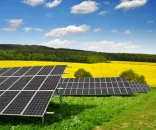Chinese solar companies form alliance for U.S. antidumping investigation
A Chinese machinery chamber on Thursday announced that it has organized 14 of the country's solar panel
companies to cope with an antidumping investigation launched by the United States.
Shi Yonghong, deputy chief of the China Chamber of Commerce for Import and Export of Machinery of Electronic
Products (CCCME), said four leading manufacturers of photovoltaic (PV) products also formed an alliance on
Thursday to jointly work on the investigation.
The U.S. antidumping duty ruling on Chinese crystalline silicon PV cells has distorted the facts on the
production and export of China's PV industries, Shi said.
"China-produced PV products have price advantages, as the industry chain has developed rapidly in recent years
in the country," said Shi, adding that many companies have adopted outstanding management modes and
forward-looking strategies with large-scale productions.
The chamber issued a statement on its website to clarify that the competitiveness of Chinese PV products has
nothing to do with dumping and that exported PV cells did not do any harm to domestic industries in the U.S.
"The prices of solar panels and other related products have fallen in the U.S. because of a global oversupply
of their raw material, crystalline silicon, not due to products made in China," said the statement.
It also said the rights and interests that Chinese companies are entitled to were not protected during the
investigation, and it seriously twisted the facts on the production costs of relevant Chinese PV companies,
which is arbitrary and result-oriented.
Chinese companies hope the U.S. Commerce Department will "correct the incorrect and unjust acts" committed
against these companies in later antidumping investigations, according to the statement.
The development of the green economy can help create new economic growth and tackle energy problems amid the
uncertainties of the global economy, Sun Guangbin, head of the solar PV sector under the CCCME.
PV companies from around the world should be aware of fair competition and adhere to the principle of free
trade, said Sun, indicating that CCCME will support the alliance.
The alliance not only aims at coping with the U.S.'s anti-dumping probe, but will also be committed to
establishing harmonious, free and equal industry order without trade barriers and disputes, said Shi Zhengrong,
chairman and chief executive officer of Suntech Power, the world's largest producer of solar panels.
China has become the largest PV products manufacturer as it boasts the output of over 60 percent of PV products
in the world.
"China's PV industry has made huge contributions to global renewable energy, so the U.S. Commerce Department's
preliminary decision to impose antidumping duties on China's PV products is not wise," said Yuan Quan, deputy
director of sales of Jiangsu Phono Solar Technology Co., Ltd.
Statistics from CCCME show that China has imported raw materials for PV products worth 2 billion U.S. dollars
from the U.S. annually in the past two years, and its expenses for transferring technologies and importing
equipment totalled more than 3 billion U.S. dollars.
Worried about the influence of the preliminary decision made by the U.S., Phono Solar Technology reduced PV
product exports to the U.S. as of April and has begun to explore the domestic market, Yuan said.
The cost of PV products exported to the U.S. will increase about 36 percent if the additional antidumping
duties are imposed, said Chen Deyin, vice president of the Shanghai-based JA Solar Holdings Co., Ltd.,
suggesting the move will bring harm to manufacturers in both countries.
Declining demand from the EU market as a result of the European debt crisis coupled with the move on the part
of the U.S. will negatively influence China's PV companies, said Shen Yuliang, an expert from the Shanghai
Institute of Foreign Trade.
The government and PV companies should focus on improving export strategies and exploring the domestic market,
Shen added.
On May 16 local time, the U.S. Commerce Department announced its affirmative preliminary determinations in
antidumping duties on Chinese PV cells, whether or not assembled into modules, imposing levies of 31.14 percent
to 249.96 percent on Chinese producers and exporters.
China's Ministry of Commerce (MOC) said on May 18 that the preliminary ruling by the U.S. on China-made solar
cells sends "negative signals of trade protectionism" to the world, urging the U.S. Commerce Department to
"right the wrongs" in upcoming probes and avoid unfair rulings.
The preliminary results will be reviewed by the Commerce Department in October and the International Trade
Commission in November.
https://news.xinhuanet.com/english/china/2012-05/24/c_123187282.htm













 Advertise
Advertise











